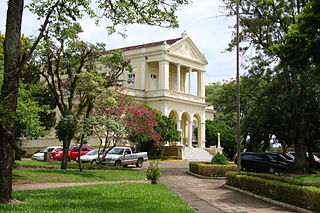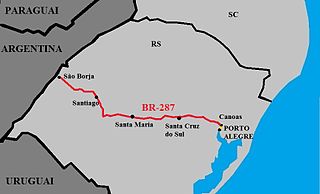
Paraná is one of the 26 states of Brazil, in the south of the country. It is bordered in the north by São Paulo state, in the east by the Atlantic Ocean, in the south by Santa Catarina state and the province of Misiones, Argentina, and in the west by Mato Grosso do Sul and Paraguay, with the Paraná River as its western boundary. It is subdivided into 399 municipalities, and its capital is the city of Curitiba. Other major cities are Londrina, Maringá, Ponta Grossa, Cascavel, São José dos Pinhais and Foz do Iguaçu. The state is home to 5.4% of the Brazilian population and generates 6.2% of the Brazilian GDP.

Rio Grande do Sul is a state in the southern region of Brazil. It is the fifth-most populous state and the ninth-largest by area. Located in the southernmost part of the country, Rio Grande do Sul is bordered clockwise by Santa Catarina to the north and northeast, the Atlantic Ocean to the east, the Uruguayan departments of Rocha, Treinta y Tres, Cerro Largo, Rivera, and Artigas to the south and southwest, and the Argentine provinces of Corrientes and Misiones to the west and northwest. The capital and largest city is Porto Alegre. The state has the highest life expectancy in Brazil, and the crime rate is relatively low compared to the Brazilian national average. The state has 5.4% of the Brazilian population and it is responsible for 6.6% of the Brazilian GDP.

The Ragamuffin War, also known as the Ragamuffin Revolution or Heroic Decade, was a republican uprising that began in southern Brazil, in the province of Rio Grande do Sul in 1835. The rebels were led by Generals Bento Gonçalves da Silva and Antônio de Sousa Neto with the support of the Italian fighter Giuseppe Garibaldi. The war ended with an agreement between the two sides, known as the Treaty of Poncho Verde, in 1845.

The South Region of Brazil is one of the five regions of Brazil. It includes the states of Paraná, Rio Grande do Sul, and Santa Catarina, and covers 576,409.6 square kilometres (222,553.0 sq mi), being the smallest region of the country, occupying only about 6.76% of the territory of Brazil. Its whole area is smaller than that of the state of Minas Gerais, in Southeast Brazil, for example or the whole metropolitan France.
Braskem S.A is a Brazilian petrochemical company headquartered in São Paulo. The company is the largest petrochemical company in Latin America and has become a major player in the international petrochemical market.

China National Tobacco Corporation (中国烟草总公司), branded as China Tobacco (中国烟草), is a national key state-owned corporation with chartered monopoly status in China to manufacture and sell tobacco products.

Companhia Siderúrgica Nacional (CSN) lit. 'National Siderurgy Company' or 'National Steel Company' is the largest fully integrated steel producer in Brazil and one of the largest in Latin America in terms of crude steel production. Its main plant is located in the city of Volta Redonda, in the state of Rio de Janeiro. Its current CEO is Benjamin Steinbruch.

Santa Cruz do Sul is a city in central Rio Grande do Sul, Brazil. The city has an estimate 131,000 inhabitants as of 2020 and sits about 150 km from the capital city of the state, Porto Alegre. The city enjoys a high standard of living and gross income per capita is 2.5 times greater than that of the state of Rio Grande do Sul as a whole.

The agriculture of Brazil is historically one of the principal bases of Brazil's economy. As of 2024 the country is the second biggest grain exporter in the world, with 19% of the international market share, and the fourth overall grain producer. Brazil is also the world's largest exporter of many popular agriculture commodities like coffee, soybeans, organic honey, beef, poultry, cane sugar, açai berry, orange juice, yerba mate, cellulose, tobacco, and the second biggest exporter of maize, pork, cotton, and ethanol. The country also has a significant presence as producer and exporter of rice, wheat, eggs, refined sugar, cocoa, beans, nuts, cassava, sisal fiber, and diverse fruits and vegetables.

Brazilian industry has its earliest origin in workshops dating from the beginning of the 19th century. Most of the country's industrial establishments appeared in the Brazilian southeast, and, according to the Commerce, Agriculture, Factories and Navigation Joint, 77 establishments registered between 1808 and 1840 were classified as "factories" or "manufacturers". However, most, about 56 establishments, would be considered workshops by today's standards, directed toward the production of soap and tallow candles, snuff, spinning and weaving, foods, melting of iron and metals, wool and silk, amongst others. They used both slaves and free laborers.

Mitsui & Co., Ltd. is one of the largest sogo shosha in Japan; it is part of the Mitsui Group.

The SBTVD Forum is a non-profit organization of private and public companies responsible for the general aspects of Digital TV deployment in Brazil. The organization was founded in 2007 in order to address all technical issues regarding the upcoming SBTVD standard, also known as ISDB-Tb.
Albino Sousa Cruz was a Brazilian businessman, founder of Souza Cruz, later the subsidiary of British American Tobacco in Brazil.
Neobus is the tradename of Brazilian bus manufacturer San Marino Ônibus e Implementos Ltda based in Caxias do Sul, Rio Grande do Sul. Neobus initiated production of buses in 1996 and has already manufactured over 30,000 vehicles. The company manufactures the bodies for a whole range of coaches, e.g. microbus, intercity and touring coach. Its primary manufacturing plant, located in Caxias do Sul.

The BR-287 is a 536.9 km-long federal highway across the Brazilian state of Rio Grande do Sul, also known as the Highway of Integration.

SLC Agrícola is one of the largest Brazilian agricultural producers, founded in 1977 by the SLC Group. It focuses on cotton, soybean, and corn. The business is controlled by the Logemann family. It was the first company of its sector whose shares were traded in a Stock Exchange. The company operates 16 farms in six Brazilian states, totaling 460,600 hectares in the 2014–15, marketing year – 260,900 hectares of which were planted with soybean, 98,500 with cotton, 43,400 with corn, and 18,100 with other crops, including coffee, wheat, corn seed, and sugarcane. Its biggest competitor is Vanguarda Agro.
Tramontina is a family-run Brazilian metallurgical company founded in 1911 by italian immigrant Valentin Tramontina. The company manufactures cutlery, cookware, home appliances, and tools for agriculture, gardening, industrial work, automotive maintenance, civil construction, and electrical repair. It's the most traditional cutlery in Brazil and the largest company of such nature in the Americas. It's headquartered in the city of Carlos Barbosa, Rio Grande do Sul. It has about 10 thousand employees and it's present in 120 countries.
Hollywood was a Brazilian brand of cigarette, owned and manufactured by Souza Cruz, a subsidiary of British American Tobacco. It is one of Brazil's best-known and sold cigarette brands, second to Derby brand.
The 2019 Copa do Brasil third stage was the third stage of the 2019 Copa do Brasil football competition. It was played from 13 March to 20 April 2019. A total of 20 teams competed in the third stage to decide ten places in the fourth stage of the 2019 Copa do Brasil.













